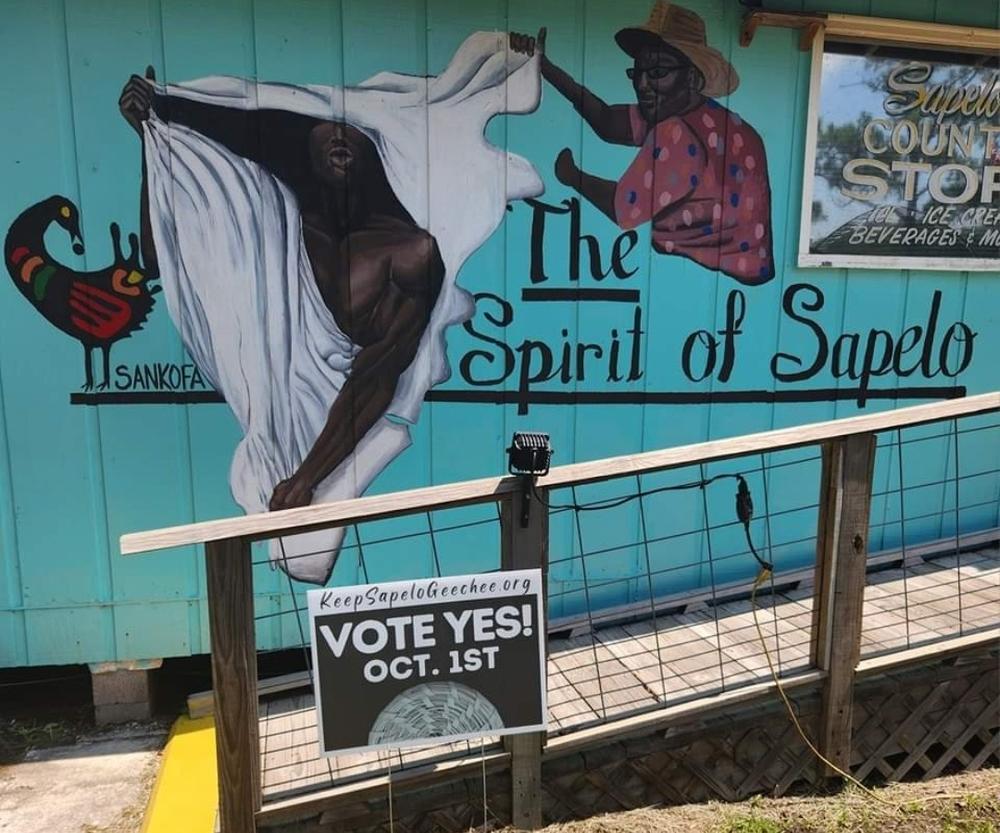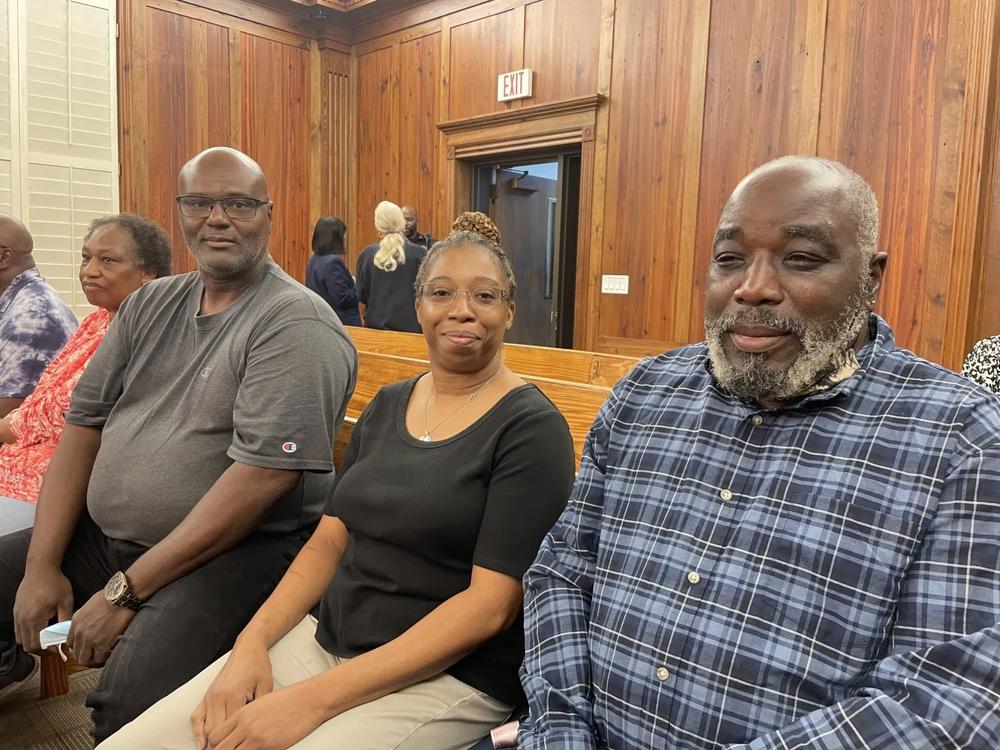
Caption
A yard sign in front of the Graball Country Store in Hogg Hummock encourages McIntosh voters to vote yes and repeal rezoning on Sapelo Island.
Credit: Jazz Watts / SICARS

A yard sign in front of the Graball Country Store in Hogg Hummock encourages McIntosh voters to vote yes and repeal rezoning on Sapelo Island.
Mary Landers, The Current
A judge on Wednesday ordered a stop to an ongoing referendum to decide the fate of new zoning in Sapelo Island’s Hogg Hummock.
The order requires the McIntosh County Board of Elections to immediately ” … cease and desist opening and staffing the polls for early voting and from opening and staffing the polling places for the Oct. 1 referendum.”
Voters had been casting early ballots at a steady clip of about 50 a day since Sept. 10 in the referendum to overturn the rezoning of Hogg Hummock. By 4 p.m. Wednesday, 818 people had already voted. Then around 5 p.m. Superior Court Senior Judge Gary C. McCorvey entered his order.
The Hogg Hummock area is inhabited by descendants of enslaved West Africans and is the last Gullah Geechee community on a Georgia barrier island. Zoning approved in September 2023 allows bigger, taller houses, which residents fear will force out Sapelo descendants in favor of wealthy developers.
More than 2,300 county residents signed a petition that forced the referendum, using a process outlined in the “home rule” provision of the Georgia Constitution. McIntosh County Probate Judge Harold Webster in July approved the petition and instructed the Board of Elections to move forward with the special election. On the same day, the McIntosh County Board of Commissioners, who had approved the controversial zoning change, challenged the validity of the election. The hearing was Friday.
“McIntosh County is pleased with the outcome and appreciates the trial court’s hard work,” wrote the county’s Cumming-based attorney Ken Jarrard, who responded to The Current in an email.
Judge McCorvey’s ruling agrees with the county’s argument that zoning issues are not subject to repeal by referendum.
Savannah-based attorney Dana Braun represents the citizens who fought to bring the issue to a vote.
“I think the essence of what (Judge McCorvey) is saying is that zoning pre-existed this home rule referendum provision, and therefore it’s not covered by it,” Braun said. “And we think that it’s an ordinance. It’s an ordinance, and all ordinances are covered by the home rule provision allowing a referendum. And we think that’s an error by the court.”
Megan Desrosiers of the nonprofit One Hundred Miles pointed to a 2022 referendum in Camden County that was similarly challenged by that county.
“We strongly disagree with the opinion issued by Judge McCorvey today,” she texted. “In fact, the question of whether the referendum tool can be used to repeal zoning ordinances came up in the Georgia Supreme Court’s review of Camden v Sweatt, where Camden County attempted to invalidate a referendum used by voters to repeal a decision to build a spaceport. In that case, the Justices unanimously agreed that the home rule/referendum clause of the Georgia Constitution applies to all sections of the constitution, even the section including zoning.”
The attorney for the probate judge, Perry-based Kellye C. Moore said her client followed not only the constitution but also the 2023 Georgia Supreme Court decision in the Camden case.
“Judge McCorvey chose to render his own interpretation of Ga. Const. art. IX, § 2, 1(b)(2) in issuing his order,” she wrote, citing the home rule provision. “It remains to be seen whether Judge McCorvey’s interpretation will stand on appeal should the petitioners seeking the referendum choose to appeal. For now, Judge Webster will do what he has done all along, follow the law and abide by the ruling of the court.”
The three named petitioners who initially filed the request for the referendum intervened in the litigation to keep the referendum alive. They are ready to appeal, said Jazz Watts, a Gullah Geechee descendant and community leader who also works on environmental justice issues for One Hundred Miles.
“I can tell you this, that the interveners are Chris Bailey, Stanley Walker and Barbara Bailey,” Watts said. “I spoke with all three of them, and they said, ‘You know what, we’re gonna fight on’.”

From left, Christopher Bailey, Barbara Bailey and Stanley Walker, intervenors in the Sapelo zoning case, await the hearing on Sept. 20, 2024.
Jarrard wrote that the county’s “chief priority is to be a good steward of taxpayer funds.”
“A primary reason this case was brought was to ensure the County does not spend funds improperly,” he wrote.
At Friday’s hearing the Board of Elections, which intervened with the county, estimated the costs to operate the polls on election day at $22,000 to $30,000.
Watts found the county’s statement ironic, given the money being spent on attorney’s fees for both the county’s challenge to the referendum and for the county’s ongoing defense of a legal challenge to the zoning itself.
“Good stewards would be actually listening to your constituents, Watts said. “The only reason we’re even here and even having this conversation, and even in the middle of litigation, is because of their actions, or in fact, their inaction and inability to actually serve the people, to actually be good stewards.”
But local Gullah Geechee people aren’t discouraged, Watts said. They knew they had an uphill battle from the start.
“We have ancestors that went through way worse things than us,” he said. “So we’re obligated to keep going, you know. We’re not going to let a ruling from this judge prevent us from reversing something that was unjust. I guess we’re going to be going to the state Supreme Court.”
This story comes to GPB through a reporting partnership with The Current.